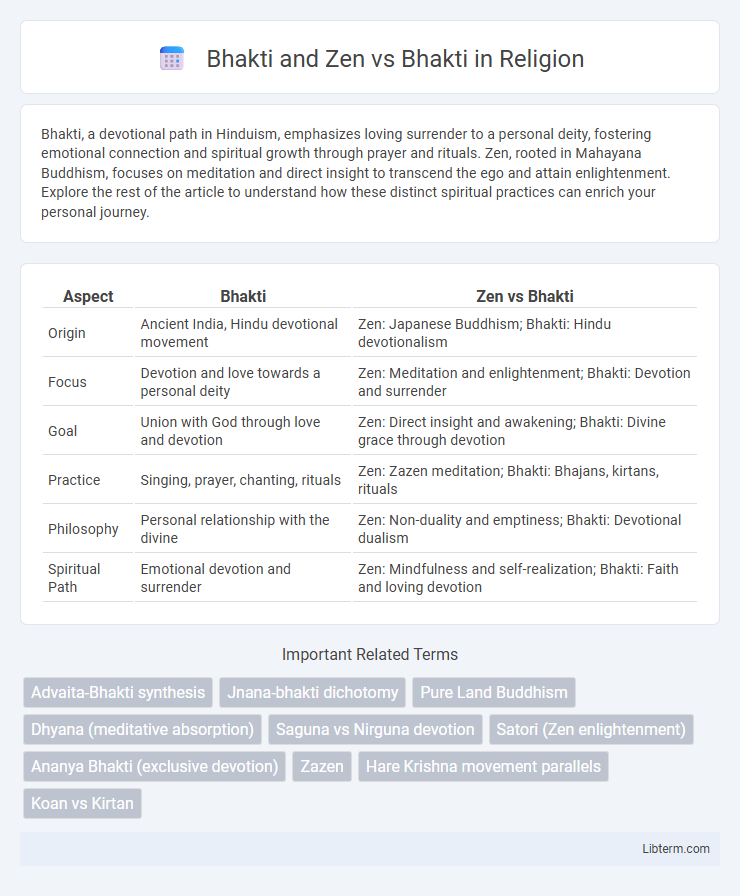Bhakti, a devotional path in Hinduism, emphasizes loving surrender to a personal deity, fostering emotional connection and spiritual growth through prayer and rituals. Zen, rooted in Mahayana Buddhism, focuses on meditation and direct insight to transcend the ego and attain enlightenment. Explore the rest of the article to understand how these distinct spiritual practices can enrich your personal journey.
Table of Comparison
| Aspect | Bhakti | Zen vs Bhakti |
|---|---|---|
| Origin | Ancient India, Hindu devotional movement | Zen: Japanese Buddhism; Bhakti: Hindu devotionalism |
| Focus | Devotion and love towards a personal deity | Zen: Meditation and enlightenment; Bhakti: Devotion and surrender |
| Goal | Union with God through love and devotion | Zen: Direct insight and awakening; Bhakti: Divine grace through devotion |
| Practice | Singing, prayer, chanting, rituals | Zen: Zazen meditation; Bhakti: Bhajans, kirtans, rituals |
| Philosophy | Personal relationship with the divine | Zen: Non-duality and emptiness; Bhakti: Devotional dualism |
| Spiritual Path | Emotional devotion and surrender | Zen: Mindfulness and self-realization; Bhakti: Faith and loving devotion |
Understanding Bhakti: Origins and Philosophy
Bhakti, rooted in ancient Indian spiritual traditions, emphasizes devotion and personal love toward a divine entity, fostering a direct emotional connection between the devotee and the deity. Zen, emerging from Mahayana Buddhism, centers on meditation and direct experiential insight into the nature of existence, contrasting Bhakti's devotional path with introspective mindfulness and enlightenment. Understanding Bhakti involves exploring its origins in Vedic scriptures and its philosophical foundation in surrender and loving devotion, which differs fundamentally from Zen's focus on self-realization and non-duality.
Core Principles of the Bhakti Path
The core principles of the Bhakti path emphasize loving devotion and surrender to a personal deity, fostering a deep emotional connection through practices like chanting, prayer, and ritual worship. Bhakti focuses on cultivating compassion, humility, and selfless service as means to attain spiritual liberation and union with the divine. Unlike Zen, which centers on meditation and direct experiential insight into emptiness, Bhakti's foundation lies in devotional love and reverence as the primary means of spiritual realization.
What is Zen? Insights into Zen Philosophy
Zen is a form of Mahayana Buddhism emphasizing direct experience, meditation (zazen), and intuitive insight over doctrinal study. It focuses on achieving satori, or sudden enlightenment, by transcending rational thought to perceive the true nature of reality. Unlike Bhakti, which centers on devotional love and surrender to a personal deity, Zen encourages self-discipline and mindfulness to attain spiritual awakening without reliance on external forms of worship.
Bhakti vs Zen: Contrasting Approaches to Spirituality
Bhakti emphasizes devotional love and personal connection to a deity, fostering emotional surrender and worship through prayer and chanting. Zen centers on direct experiential insight gained via meditation, promoting mindfulness and self-realization without reliance on a deity. These contrasting approaches highlight Bhakti's theistic devotion versus Zen's non-theistic, introspective path to spiritual awakening.
Meditation in Zen and Devotion in Bhakti
Zen meditation emphasizes mindfulness and seated practice (zazen) to achieve direct insight into the nature of reality, fostering deep awareness and mental clarity. Bhakti centers on devotion through chanting, prayer, and surrender to a personal deity, cultivating love and emotional connection as the path to spiritual liberation. While Zen prioritizes meditation as a method for self-realization, Bhakti relies on devotional practices to nurture the bond between devotee and divine.
The Role of the Guru: Bhakti and Zen Perspectives
In Bhakti traditions, the guru is revered as a divine guide who imparts spiritual knowledge and facilitates the devotee's personal relationship with the deity, emphasizing surrender and devotion. Zen Buddhism, by contrast, views the guru or roshi as a direct transmitter of insight through meditation and koan practice, encouraging spontaneous awakening rather than devotional surrender. Both perspectives highlight the guru's essential role in spiritual awakening but differ in approach: Bhakti centers on the guru's role in devotional love, while Zen emphasizes experiential realization.
Bhakti and Zen in Daily Life: Practices Compared
Bhakti and Zen both emphasize mindfulness but differ in their daily practices; Bhakti centers on devotional activities like chanting, prayer, and rituals aimed at fostering a personal relationship with the divine, while Zen focuses on meditation, breath awareness, and direct experience to cultivate inner peace and insight. Bhakti incorporates expressions of love and surrender to a higher power, often through repetitive recitation of divine names, whereas Zen practices encourage silent sitting (zazen) and observing thoughts without attachment. Integrating Bhakti and Zen in daily life merges devotion and meditation, balancing emotional connection with contemplative stillness.
Inner Experience: Surrender vs Awareness
Bhakti primarily emphasizes surrender, where devotees cultivate a deep emotional connection and complete devotion to the divine, fostering an inner experience of love and submission. Zen centers on awareness, encouraging practitioners to engage in mindful observation and presence, cultivating insight through direct, non-conceptual experience of reality. The contrast lies in Bhakti's focus on heartfelt surrender as a path to spiritual union, whereas Zen prioritizes cultivating pure awareness to transcend the ego and realize true nature.
Integrating Bhakti with Zen: Possibilities and Challenges
Integrating Bhakti and Zen presents unique possibilities for spiritual growth by combining Bhakti's devotional love and surrender with Zen's emphasis on direct experiential insight and mindfulness. Challenges arise from Bhakti's theistic framework centered on personal deity worship, contrasting with Zen's non-theistic, paradoxical approach to enlightenment beyond conceptualization. Successful integration requires balancing Bhakti's emotional depth with Zen's meditative discipline, fostering a holistic path that respects both devotional intensity and Zen's emphasis on awakening through present-moment awareness.
Choosing a Path: Which Resonates With You?
Choosing a spiritual path involves understanding key differences between Bhakti and Zen traditions. Bhakti emphasizes devotional love and personal connection with a deity, fostering emotional engagement and rituals focused on worship and surrender. Zen centers on meditation and direct experience of enlightenment, encouraging practitioners to quiet the mind and transcend conceptual thinking.
Bhakti and Zen Infographic

 libterm.com
libterm.com